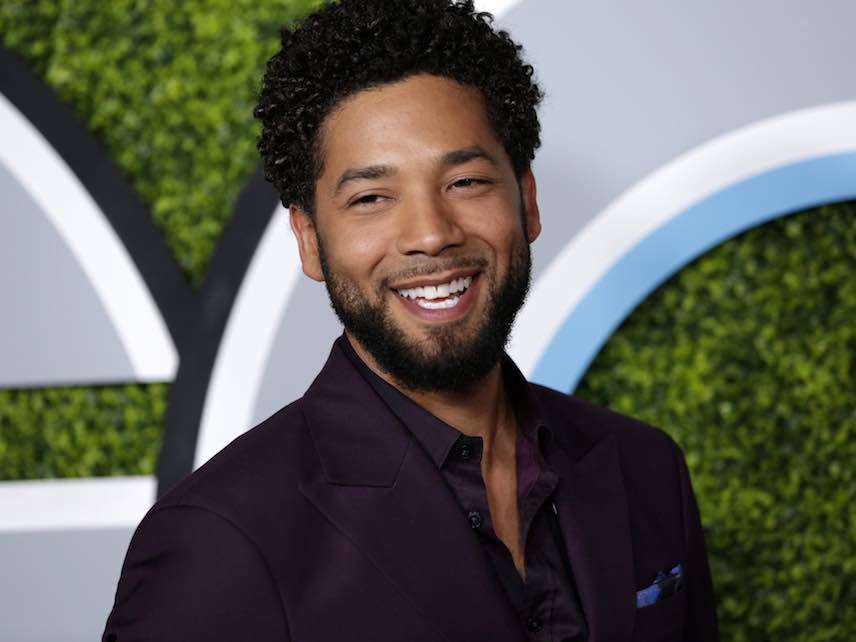Jussie Smollett Reminds Us That Some Hate Crimes Are Hoaxes—and the Statistics Are a Mess
As the investigation turns on the Empire star, it's important not to confuse "reality" with "narrative."

Multiple news outlets have now reported that Chicago police no longer consider Empire actor Jussie Smollett to be the victim of a potential hate crime. On the contrary, they suspect he faked the January 29 incident, with the help of two acquaintances who now appear to have flipped on him.
Chicago PD has not yet confirmed any of this, and Smollett maintains his innocence. But it's increasingly difficult to believe that Smollett was uninvolved, given that the two men captured on surveillance video near the scene of the alleged attack are by all accounts Abimbola and Olabinjo Osundairo, a pair of brothers who worked as extras on Empire.
Many people, of course, suspected that Smollett was lying from the start. His claim that he was attacked by random Trump supporters in downtown Chicago at 2:00 a.m. on one of the coldest nights imaginable was hard to swallow. Those who work in right-leaning and alternative media were most vocal, though I had private conversations with several left-of-center writers who shared my doubts.
In contrast, many left-leaning politicians, celebrities, and media figures rushed to condemn Trump supporters as complicit in an obvious hate crime. GQ's Joshua Rivera declared that "The Racist, Homophobic Attack on Jussie Smollett Is Far-Right America's Endgame." He also accused all those who referred to Smollett as the victim of a "potential" hate crime of inflicting an additional "wound" on Smollett. Cautious authority figures were engaged in "a careful hedging of bets that don't need to be hedged," he wrote. Suffice it to say, this piece has not aged well.
No doubt some conservatives went looking for holes in Smollett's story because they wanted to rebut a criticism of President Donald Trump (i.e., that his rhetoric emboldens racists and bigots). But many liberal pundits and thinkers simply believed Smollett because it confirmed all of their biases about the president's supporters. On Monday, in the wake of revelations about Smollett's likely deception, The Washington Post's Jonathan Capehart told MSNBC that what happened to the black, gay actor "fit in with a narrative." Before he even finished the word "narrative," he corrected himself: "not a narrative, but a reality for a lot of people in this country since President Trump was inaugurated." Many on the left believe that Trump has unleashed a wave of racist, xenophobic, bigoted hatred across America, irrespective of the details of a single incident.
But despite Trump's very real history of making disparaging remarks about all kinds of people, there is not a lot of statistical evidence to support the notion that hate crimes are surging. While it's true that the FBI's count of hate crimes rose 17 percent from 2016 to 2017, it's important to note that 1,000 additional agencies reported information to the FBI in the latter year. It should go without saying, but as the number of agencies participating in the FBI's count of hate crimes grows more numerous, the total number of hate crimes will undoubtedly rise. This does not necessarily mean that hate crimes are surging—just that the authorities undercounted them previously.
Statistics, of course, are easily mischaracterized. A few months ago, many in the media became obsessed with a figure from the Anti-Defamation League, which purportedly showed that anti-Semitism had spiked a whopping 57 percent under Trump. But part of that statistic reflected an increase in bomb threats against U.S.-based Jewish institutions perpetrated by just one person: a deranged Israeli teenager. Anti-Semitic violence, according to the ADL's count, actually decreased 47 percent.
Hate crimes do happen. But some alleged hate crimes turn out to be mistakes or hoaxes. Quillette's Andy Ngo has compiled a useful list; in writing about free speech on college campuses, I have frequently encountered alleged bias incidents that turned out to be false. (My forthcoming book, Panic Attack: Young Radicals in the Age of Trump, contains many more examples.) Recently, virtually everyone in the media uncritically accepted claims by a Native American man, Nathan Phillips, that a group of Catholic high school boys racially harassed him on the steps of the Lincoln Memorial, but additional reporting showed his claims were wildly misleading.
None of this means that racism and other forms of bigotry are nonexistent, or even that they're rare. But reality is often quite complicated, and it's important for reporters to add context, clarification, and caveats when discussing the news—no matter how much this displeases the automatically-believe-victims crowd.
(Below, watch Reason contributor Kmele Foster—who hosts the Fifth Column podcast with Matt Welch and Michael C. Moynihan—attempt to inform Vox's Liz Plank about the finer points of the FBI's hate crime statistics as she repeatedly interrupts him.)


Show Comments (364)